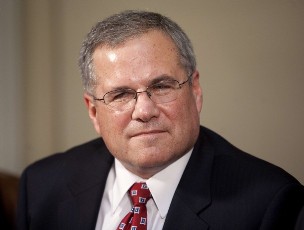US State Dept. moves toward appeasement policy with Khartoum
April 26, 2009 (WASHINGTON) – The United States of America is positioning itself to become “friends” with the Government of Sudan, seeing this approach as the best way to improve the situation in Darfur and reach a political settlement, according to a closed briefing given by Special Envoy Scott Gration at the US State Department on April 20, 2009.

“The US doesn’t have a lot of political leverage with the Government of Sudan. The best lever he [Gration] sees is that they want to be our friends,” stated the attendee of the meeting.
Likewise, the state-run Sudan Media Center reported today that the presidential envoy, in another visit to Khartoum beginning May 5, “would offer new proposals for normalization between Khartoum and Washington.”
Gration signalled the possibility of such normalization talks on April 2 after meeting officials at the Sudanese Ministry of Foreign Affairs. “The United States and Sudan want to be partners and so we are looking for opportunities for us to build a stronger bilateral relationship,” he said.
During Gration’s recent visit to Khartoum, one US official disclosed that some in the State Department had not been aware that he would adopt such conciliatory language.
It is also unclear whether higher-level US administration officials would approve actual normalization, given that Barack Obama last year called the Bush administration’s own normalization talks with Sudan a “reckless and cynical initiative.”
But the State Department’s inclination toward this approach has been evident for some time, and it is neatly consistent with the administration’s new theme of “national security through diplomacy.”
Efforts to normalize relations were tried in the first half of 2008, but fell apart after the former special envoy, Ambassador Richard Williamson, decided against the talks and recommended several military options to President George W. Bush.
Even after the normalization talks had ended, the top career diplomat in the Sudan Programs Group, Tim Shortley, spent a week in October 2008 at a Sudanese government-sponsored political forum on Darfur, which he described as “an effort to finalize a Darfur peace package” — apparently a reference to negotiations that since have been rebuffed by the largest rebel movements following major fighting, displacement, and death sentences issued against imprisoned rebel fighters.
Shortley, who declined to be interviewed about a trip to Khartoum in February 2009, spearheaded the US government’s quiet diplomacy with Sudan before accompanying Gration on the more public visit to the country from April 2 till April 8.
In upcoming travel, the US State Department’s Sudan team plans to urge two major Darfur rebel movements to enter talks with the Government of Sudan while backing down from past demands on humanitarian aid and easing support for some provisions of the 2005 Comprehensive Peace Agreement.
With the watchful approval of Washington, the National Elections Commission this month delayed Sudan’s treaty-mandated elections from July 2009 till February 2010, and the US Agency for International Development – which had commissioned a study urging such a postponement – extended a $ 25 million grant to support the general elections only after this decision was announced.
During the briefing last week, Gration diverged from the rhetoric of other US officials in discussing the nature of the Darfur conflict. Rather than speaking of “ongoing genocide,” he instead characterized the situation as a “low-intensity conflict and therefore different from 2003-2005,” the first few years of the Darfur conflict.
Although this is a view taken by other outside observers, such as the British commentator on the region Alex De Waal, it is not shared by the former envoy, Richard Williamson, who endorsed the genocide charge of the International Criminal Court and attributed the lower levels of violence to fewer “targets of opportunity” due to massive displacement.
Another former Bush administration official, Ambassador John Bolton, in an interview April 1 criticized the special envoy position itself, calling it “a polite way to distance Secretary Clinton from the thing.” Bolton recently advocated toppling the Sudanese government.
But Gration believes that engagement would be more helpful. Responding to a question at the briefing about the Sudanese government obstructing the work of NGOs in Darfur, he referred to an agreement which he allegedly reached with the government on this issue, indicating that the government had agreed to allow more international aid groups into Darfur, but said that this decision would take time to be communicated to lower levels of the Sudanese bureaucracy.
Gration plans to assess the government’s commitment to the alleged aid deal when he returns May 9.
Despite some tensions over the past six years, the US reached a rapprochement with Khartoum in about 2001. Beginning in May 2004, it removed Sudan from its list of states not cooperating in the “war on terror.”
Since then, in a rare public indication of the attitude of the US intelligence community, the State Department’s Office of the Coordinator for Counterterrorism has openly reported that Sudan continues to make a “cooperative commitment” against terrorist elements.
Gration announced at the briefing that he intends to start a high-level, international contact group, which would include intelligence officials.
(ST)
